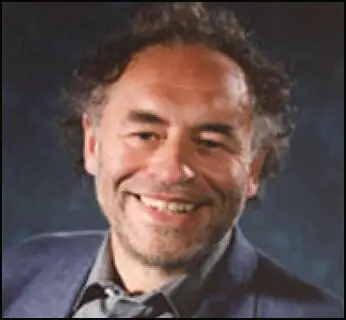On this day on 4th March
On this day in 1681 King Charles II grants a land charter to William Penn for a large area in North America. George Fox was in poor health and Penn became the unofficial leader of the Quakers . He enjoyed a good relationship with the king and in 1681 he suggested that there should be a mass emigration of English Quakers. Some Quakers had already moved to North America, but Puritans were as hostile towards Quakers as Anglicans in England were and some of the Quakers had been banished to the Caribbean. The king, who owed the Penn family a considerable amount of money, handed over a large piece of land that included the present-day states of Pennsylvania and Delaware. Penn immediately set sail and took his first step on American soil in 1682. Penn gave Fox 1,266 acres of land, but he was too ill to take it up.
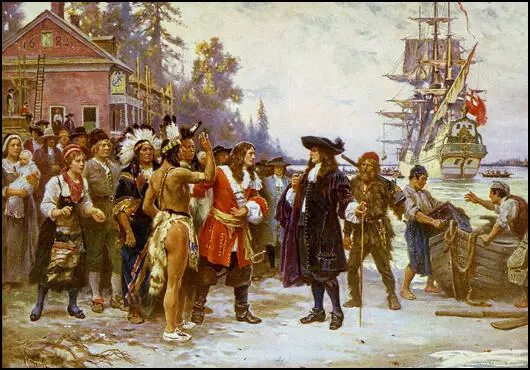
On this day in 1900 blacklisted director Herbert Biberman was born in Philadelphia. Educated at the University of Pennsylvania he spent several years in Europe before joining the family textile business.
In 1928 Biberman joined the Theater Guild as an assistant stage manager and the following year directed the Soviet play, Red Rust (1929). After marrying the actress Gale Sondergaard in 1930, Biberman directed three more plays: Roar China (1930), Green Grow the Lilacs (1930) and Miracle at Verdun (1934).
Biberman moved to Hollywood and directed One Way Ticket (1935), Meet Nero Wolfe (1936) and The Master Race (1944). He also wrote Together Again (1944) and New Orleans (1947).
After the Second World War the House of Un-American Activities Committee began an investigation into the Hollywood Motion Picture Industry. In September 1947, the HUAC interviewed 41 people who were working in Hollywood. These people attended voluntarily and became known as "friendly witnesses". During their interviews they named several people who they accused of holding left-wing views.
Biberman appeared before the HUAC on 29th October, 1947, but like, Alvah Bessie, Lester Cole, Albert Maltz, Adrian Scott, Dalton Trumbo, Edward Dmytryk, Ring Lardner Jr., Samuel Ornitz and John Howard Lawson, he refused to answer any questions. Known as the Hollywood Ten, they claimed that the 1st Amendment of the United States Constitution gave them the right to do this. The House of Un-American Activities Committee and the courts during appeals disagreed and all were found guilty of contempt of Congress and Biberman was sentenced to six months in Texarkana Federal Correctional Institution and fined $1,000.
Blacklisted by the Hollywood studios, Biberman was forced to finance his own work. In 1954 he worked with Michael Wilson, Adrian Scott and Paul Jarrico on Salt of the Earth (1954), a film about a mining strike in New Mexico. Although the film earned critical acclaim in Europe, winning awards in France and Czechoslovakia, it was not allowed to be shown in the United States until 1965.
After the blacklist was lifted, Herbert Biberman was able to write the screenplay and direct the movie, Slaves (1969), an adaptation of Uncle Tom's Cabin. Herbert Biberman died of bone cancer on 30th June, 1971.
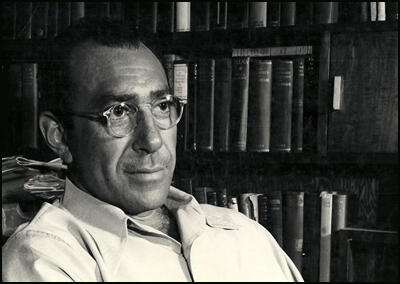
On this day in 1912 the Women's Social & Political Union (WSPU) organised a window-breaking demonstration in Whitehall. Frederick Pethick-Lawrence and Emmeline Pethick-Lawrence both disagreed with this strategy but Christabel Pankhurst ignored their objections. Records seized as evidence show the imtvitation sent out by Emmeline Pankhurst: "Men and women I invite you to come to Parliament Square on Monday, March 4th 1912 at 8 o'clock to take part in a 'Great Protest Meeting' against the government's refusal to include women in their reform Bill. Speeches will be delivered by well-known Suffragettes, who want to enlist your sympathy and help in the great battle they are fighting for human liberty." This vaguely-titled ‘Great Militant Protest' was a "skilfully planned secret attack" that would involve over 150 women armed with hammers, stones and clubs simultaneously smashing the windows of shops and offices in London's West End.
Victoria Lidiard from Bristol was one of the women who volunteered to take part in the demonstration. The severely disabled, May Billinghurst, agreed to hide some of the stones underneath the rug covering her knees. According to Votes for Women: "From in front, behind, from every side it came - a hammering, crashing, splintering sound unheard in the annals of shopping... At the windows excited crowds collected, shouting, gesticulating. At the centre of each crowd stood a woman, pale, calm and silent."
Victoria broke a window at the War Office. She later recalled: "He just looked at me. Meantime another policeman rushed up towards me and then an inspector on horseback came. So I was escorted to Bow Street, a policeman each side of me, clutching my arm. and one behind. Well, I had eight stones, but I'd only used one so on the way to the police station I dropped them one by one and to my amazement when I was taken down at Bow Street, this policeman that had followed put the seven stones on the table and said, She dropped these on the way." Victoria was one of 200 suffragettes who was arrested and jailed for taking part in the demonstration.
Victoria got two months. Bella Hoffman has pointed out: "Her memory of Holloway was of one of her own sisters shouting encouraging messages from across the street, standing on a chair in her cell and singing out of the barred window, and the black beetle in her porridge." Under instructions from her mother, Victoria did not go on hunger-strike. As she later pointed out in a BBC interview, although she was willing to go to prison for women's suffrage, she was unable to disobey an order given by her mother.
Over 126 women were committed for trial following the window smashing campaign. For many it was their first offence. The sentences at the trial ranged from 14 days to six months; 76 women were given sentences of hard labour. The harsh sentences meted out to working class suffragettes did not escape the attention of the accused or their supporters. Victoria Lidiard got two months. Bella Hoffman has pointed out: "Her memory of Holloway was of one of her own sisters shouting encouraging messages from across the street, standing on a chair in her cell and singing out of the barred window, and the black beetle in her porridge." Under instructions from her mother, Victoria did not go on hunger-strike. As she later pointed out in a BBC interview, although she was willing to go to prison for women's suffrage, she was unable to disobey an order given by her mother.
The government ordered the arrest of the leaders of the WSPU. Christabel Pankhurst escaped to France but Frederick Pethick-Lawrence and Emmeline Pethick-Lawrence were arrested, tried and sentenced to nine months imprisonment. They were also successfully sued for the cost of the damage caused by the WSPU.
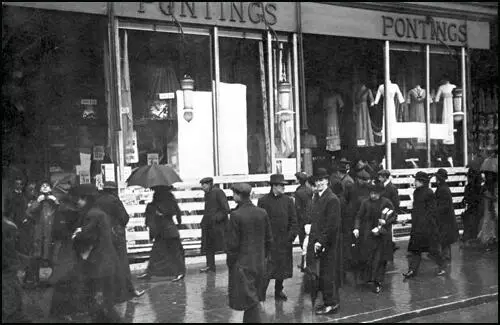
by Women's Social & Political Union members (4th March, 1912)
Jacob Garfinkle (John Garfield) was born in New York City on 4th March, 1913. His father, a clothes-presser, was a immigrant from Russia (Ukraine). The family lived in extreme poverty and after the death of his mother in 1920 Garfield was brought up by relatives.
Garfield was a poor student until he came under the influence of one of his teachers, Angelo Patri. Garfield later said that Patri "reached into the garbage pail and pulled me out." Patri encouraged Garfield to take up acting and helped him win a scholarship to the Heckscher Foundation Drama Workshop.
After leaving school Garfield travelled the country looking for work. He lived the life of a hobo until finding work as an apprentice with the Civic Repertory Theatre in 1932. Later that year Garfield joined the Group Theatre, an organization formed by Harold Clurman, Cheryl Crawford and Lee Strasberg. The group was a pioneering attempt to create a theatre collective, a company of players trained in a unified style and dedicated to presenting contemporary plays. Others involved in the group included Elia Kazan, Stella Adler, Luther Adler, Will Geer, Howard Da Silva, Franchot Tone, John Randolph, Joseph Bromberg, Michael Gordon, Paul Green, Clifford Odets, Paul Strand, Kurt Weill and Lee J. Cobb. Members of the group tended to hold left-wing political views and wanted to produce plays that dealt with important social issues.
While working at the Group Theatre, Lee Strasberg developed what became known as the Method. Based on the ideas of the Russian director, Konstantin Stanislavsky, it was a system of training and rehearsal for actors which bases a performance upon inner emotional experience, discovered largely through the medium of improvisation. Garfield appeared in several productions including Awake and Sing! and Waiting for Lefty. Both these plays were written by the Group Theatre's greatest playwright, Clifford Odets. During his time at the Group Theatre he married his childhood sweetheart, Roberta Seidman.
John Garfield received excellent reviews for his performances with the Group Theatre and he was offered parts in Hollywood movies and in 1938 signed a seven year contract with Warner Brothers. His first film, Four Daughters , was well received and Garfield was nominated for an Academy Award for his performance. Over the next few years he made several films including Blackwell's Island (1939), Daughters Courageous (1939), Dust Be My Destiny (1939), Juarez (1939), They Made Me a Criminal (1939).
On the outbreak of the Second World War Garfield attempted to join the armed forces but failed his medical as a result of a heart condition. Desperate to make a contribution to the war effort Garfield joined with Bette Davis to form the Hollywood Canteen. This restaurant provided servicemen on leave in Los Angeles with free meals. Garfield also arranged for the men to be entertained at the Hollywood Canteen by some of the countries leading stars.
During the war Garfield made several films including Years Without Days (1940), Saturday's Children (1940), Flowing Gold (1940), East of the River (1940) , The Sea Wolf (1941), Dangerously They Live (1941), Out of the Fog (1941), Tortilla Flat (1942), Air Force (1943), Destination Tokyo (1943), The Fallen Sparrow (1943), Thank Your Lucky Stars (1943), Between Two Worlds (1944), Forever in Love (1945), Nobody Lives Forever (1946) Humoresque (1946) and The Postman Always Rings Twice (1946).
Garfield's contract with Warner Brothers expired in 1946. Unhappy with some of the films he had been forced to act in, he decided to opt out of the studio system and formed his own production company called Enterprise. He told the press: "I've saved every penny I made and now I'm going to do the pictures I want to do." His first film as an independent was Body and Soul . Written by Abraham Polonsky and directed by Robert Rossen the cast included several of Garfield's left-wing friends, including Canada Lee and Anne Revere.
In 1947 Garfield became involved in a film project, Gentleman's Agreement, that attempted to deal with the topic of anti-Semitism. Directed by Elia Kazan, it included a cast of people that shared Garfield's left-wing opinions including Anne Revere, Gregory Peck, Sam Jaffe, Joan Havoc and Jane Wyatt. The authors of Radical Hollywood (2002) have argued: "Garfield, as the returning Jewish soldier tired of hearing liberal talk about the 'poor little Jews', who hits the hardest, virtually demanding social change; and Anne Revere, the protagonist's mother, who vows to live on to see a better world." The film was a great success and won three Academy Awards.
Garfield also appeared in Daisy Kenyon (1947), Difficult Years (1948), Force of Evil (1948), We Were Strangers (1949), Jigsaw (1949), Under My Skin (1950), The Breaking Point (1950) and He Ran All the Way (1951).
During this period the House of Un-American Activities Committee (HUAC) opened its hearings concerning communist infiltration of the motion picture industry. The chief investigator for the committee was Robert E. Stripling. The first people it interviewed included Ronald Reagan, Gary Cooper, Ayn Rand, Jack L. Warner, Robert Taylor, Adolphe Menjou, Robert Montgomery, Walt Disney, Thomas Leo McCarey and George L. Murphy. These people named several possible members of the American Communist Party.
As a result their investigations, the HUAC announced it wished to interview nineteen members of the film industry that they believed might be members of the American Communist Party. This included Larry Parks, Herbert Biberman, Alvah Bessie, Lester Cole, Albert Maltz, Adrian Scott, Dalton Trumbo, Edward Dmytryk, Ring Lardner Jr., Samuel Ornitz, John Howard Lawson, Waldo Salt, Bertolt Brecht, Richard Collins, Gordon Kahn, Robert Rossen, Lewis Milestone and Irving Pichel.
The first ten witnesses called to appear before the HUAC, Biberman, Bessie, Cole, Maltz, Scott, Trumbo, Dmytryk, Lardner, Ornitz and Lawson, refused to cooperate at the September hearings and were charged with "contempt of Congress". Known as the Hollywood Ten, they claimed that the 1st Amendment of the United States Constitution gave them the right to do this. The courts disagreed and each was sentenced to between six and twelve months in prison. The case went before the Supreme Court in April 1950, but with only Justices Hugo Black and William Douglas dissenting, the sentences were confirmed.
In June, 1950, three former FBI agents and a right-wing television producer, Vincent Hartnett, published Red Channels, a pamphlet listing the names of 151 writers, directors and performers who they claimed had been members of subversive organisations before the Second World War but had not so far been blacklisted. The names had been compiled from FBI files and a detailed analysis of the Daily Worker, a newspaper published by the American Communist Party. A free copy was sent to those involved in employing people in the entertainment industry. All those people named in the pamphlet were blacklisted until they appeared in front of the House of Un-American Activities Committee (HUAC) and convinced its members they had completely renounced their radical past.
John Garfield appeared before the HUAC on 23rd April, 1951. He answer questions and denied he ever joined the American Communist Party or knew any of its members. He did admit to being a supporter of left-wing causes and during the 1930s had spoken at Joint Anti-Fascist Refugee Committee meetings and in the 1948 Presidential Election he had advocated the election of Henry Wallace, the Progressive Party candidate.
Donald L. Jackson questioned Garfield's account about his knowledge of what was going on in Hollywood: "Do you contend that during the seven years or more that you were in Hollywood and in close contact with a situation in which a number of Communist cells were operating on a week-to-week basis, with electricians, actors, and every class represented, that during the entire period of time you were in Hollywood you did not know of your own personal knowledge a member of the Communist Party?"
Garfield replied: "When I was originally requested to appear before the committee, I said that I would answer all questions, fully and without any reservations, and that is what I have done. I have nothing to be ashamed of and nothing to hide. My life is an open book. I was glad to appear before you and talk with you. I am no Red. I am no pink. I am no fellow traveler. I am a Democrat by politics, a liberal by inclination, and a loyal citizen of this country by every act of my life."
Roy M. Brewer of the International Alliance of Theatrical Stage Employees appeared on 17th May. He testified that he did not believe that John Garfield was telling the truth. He argued that it was impossible for an actor in Hollywood and not to be aware of the power of the American Communist Party. "I do not think the opinion of one man is of much value, but I think if you could document the employment records of those individuals that were not acceptable to the Communist group as against those individuals who were in the forefront of it, I think you would find a rather substantial indication that there were influences at work. Those influences work in many, many ways. Lots of times the opinion of a secretary or of a clerk in a casting bureau can make the difference between whether one man is hired or another man is hired. I can see, from my standpoint, knowing the set-up in Hollywood, how easy it would be for an underground movement to use influence in such a way that an individual without such protection would be at a disadvantage, and I am of the definite opinion that was the case. I think it can be proven by records. I haven't attempted to do that, but in my judgment it could be done."
Some members of the Group Theatre like Elia Kazan, Clifford Odets and Lee J. Cobb testified and named other members of left-wing groups. Other former members, including Garfield, Stella Adler, Will Geer, Howard Da Silva, John Randolph, and Joseph Bromberg refused to give the names of left-wing friends and were blacklisted.
John Garfield died of a heart attack on 21st May, 1952. Only thirty-nine years old, his family and friends claimed that the stress brought on by McCarthyism was a major factor in his early death. His daughter later recalled: "It killed him, it really killed him. He was under unbelievable stress. Phones were being tapped. He was being followed by the FBI. He hadn't worked in 18 months. He was finally supposed to do Golden Boy on CBS with Kim Stanley. They did one scene. And then CBS canceled it. He died a day or two later."
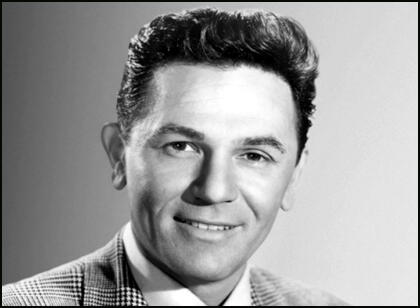
On this day in 1917 Jeannette Rankin becomes the first female member of the United States House of Representatives. A member of the Republican Party, Rankin campaigned for universal suffrage, prohibition, child welfare reform, an end to child labour and staying out of the First World War. One of her first actions was to introduce a bill that would have allowed women citizenship independent of their husbands.
A pacifist, Rankin was one of the 49 members of Congress to vote against war with Germany. Fellow suffragists such as Carrie Chapman Catt urged Rankin to change her mind, fearing that she would damage the cause by reflecting the view that women were sentimental and irresponsible.
Rankin's controversial views on the First World War, trade union rights, equal pay and birth-control, lost her the Republican Senate nomination in 1918. She therefore stood as an independent but without the support of a party machine, was easily defeated.
After the war Rankin successfully campaigned for independent citizenship (1922), the Maternity and Infancy Protection Act (1921), Independent Citizenship (1922) and Child Labour Amendment (1924). Rankin was also active in the Women's International League for Peace and Freedom and the National Council for the Prevention of War.
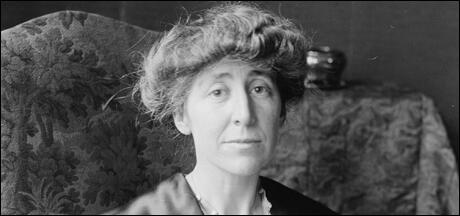
On this day in 1933 President Franklin D. Roosevelt appointed Frances Perkins as his Secretary of Labor. She therefore became the first woman in American history to hold a Cabinet post. As she revealed later, her first proposals included: "immediate federal aid to the states for direct unemployment relief, an extensive program of public works, a study and an approach to the establishment by federal law of minimum wages, maximum hours, true unemployment and old-age insurance, abolition of child labour, and the creation of a federal employment service." Although it was a very radical programme, Roosevelt accepted it with enthusiasm.
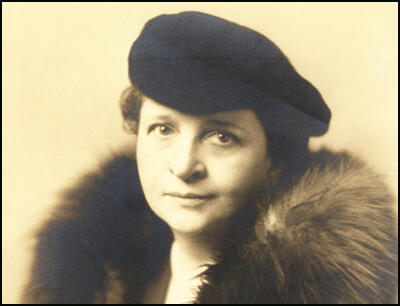
On this day in 1940 progressive publisher Hamlin Garland died. Garland was born in West Salem, Wisconsin, on 14th September, 1860. His family were farmers struggling to make a living from the land. During his childhood his family moved from Wisconsin to Iowa and later to South Dakota.
Unable to afford a university education, Garland moved to Boston where he spent 14 hours a day reading in the public library. He eventually became a teacher at Moses True Brown's Boston School of Oratory. A brilliant teacher, Garland became a touring lecturer where he gave public talks on American, French and German authors.
Garland began contributing articles and stories to Harper's Weekly. A collection of his stories, Main Traveled Roads, appeared in 1891. Highly acclaimed, the book provided an unromantic view of farming. He dedicated the book to his parents: "whose half-century pilgrimage on the main roads of life has brought them only toil and deprivation."
Garland followed Main Traveled Roads with two other collections of short stories, Prairie Folks (1892) and Wayside Courtships (1897). In his book Crumbling Idols (1894), Garland put forward the theory of realistic fiction, which he called veritism. Stephen Crane, another supporter of veritism, explained that: "The realist or veritist is really an optimist, a dreamer. He sees life in terms of what it might be, as well as in terms of what it is; but he writes of what is, and, at his best, suggests what is to be."
Garland's novels were criticised as being overtly political propaganda. This included Jason Edwards (1892), A Member of the Third House (1892) and A Spoil of Office (1892). Other novels written by Garland included Rose of Dutcher's Coolly (1895) and The Captain of the Gray-Horse Troop (1902).
Hamlin Garland returned to form with two outstanding volumes of autobiography, A Son of the Middle Border (1917) and A Daughter of the Middle Border (1921). In 1922 Garland inherited a considerable fortune. A socialist, Garland decided to set up an institution to dispense money to radical, liberal and trade union causes.
Over the next few years the American Fund for Public Service provided financial help to the National Association for the Advancement of Coloured People in its campaign against lynching, subsidized the radical magazine New Masses and aided the defence of Bartolomeo Vanzetti and Nicola Sacco. Hamlin Garland, who was awarded the Pulitzer Prize in 1922..
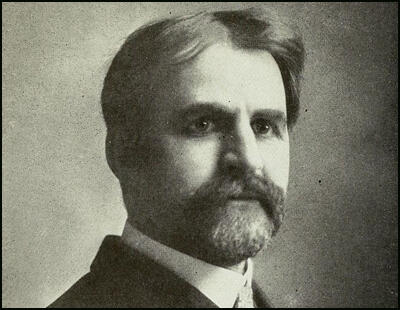
On this day in 1956 cartoonist Sidney Strube died. Sidney, the son of Frederick Strube, was born in Bishopsgate on 30th December 1892. After studying at St Martin's School of Art he found work as a draughtsman for a furniture company before joining a small advertising agency.
In 1910 he enrolled at the John Hassall Art School he began producing cartoons. He sold his first work to the Conservative and Unionist magazine in 1909, Soon afterwards he began producing a weekly cartoon for Throne and Country. He also had cartoons published in The Bystander.
On the outbreak of the First World War Strube joined the Artists' Rifles. Instead of being sent abroad he became a PT and bayonet instructor. After leaving the army in 1918 he became the political cartoonist of The Daily Express.
Martin Walker pointed out in his book, Daily Sketches: A Cartoon History of Twentieth Century Britain (1978) that "Strube... created John Citizen, a sharp-eyed alert little fellow who got whiter with the years, but he always wore the same bowler hat, was always patriotic." Strube described his character as someone "with his everyday grumbles and problems, trying to keep his ear to the ground, his nose to the grindstone, his eye to the future and his chin up - all at the same time."
Strube was a great supporter of the Conservative Party. During the General Strike in 1926, Stanley Baldwin was portrayed as John Bull whereas Ramsay MacDonald, the leader of the Labour Party wore a "foreign-looking striped shirt".
According to Mark Bryant Strube "worked on Whatman board with indian ink after sketching preliminary outlines in pencil." Influenced by the work of Bernard Partridge, Frank Reynolds and David Low, his cartoons were so successful that by 1931 he was being paid £10,000 a year by The Daily Express.
During the Second World War Sidney Strube produced a series of very patriotic cartoons. This included several of Winston Churchill, who was often portrayed as a bull-dog. He also provided drawings for several propaganda posters that were published by the British government.
Sidney Strube was sacked in 1948 after an argument with the editor The Daily Express and was replaced by Michael Cummings as the newspaper's chief political cartoonist. He then freelanced for The Sunday Times, Time and Tide and The Tatler.
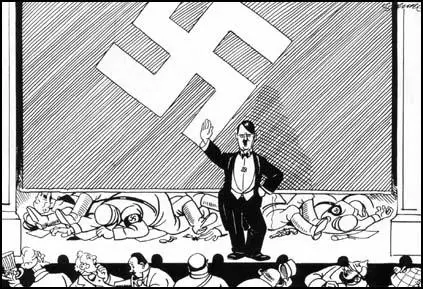
Sidney Strube, Daily Express (3rd July, 1934)
On this day in 2002 historian Roy Porter died. Porter, the only child of a jeweller, was born in London on 31st December 1946. After obtaining a double first in history at Cambridge University (1968) he was granted a junior fellowship at Christ's College.
In 1972 he began work as director of studies in history at Churchill College, Cambridge. Five years later he was appointed dean of the college. His PhD thesis was published as The Making of Geology in 1977.
Porter moved to the Welcome Institute for the History of Medicine in 1979. Elected a fellow of the British Academy in 1994, he was also made an honorary fellow of both the Royal College of Physicians and the Royal College of Psychiatrists.
Porter wrote or edited over 100 books. This included English Society in the 18th Century (1990), Gibbon (1994), Disease, Medicine and Society in England, 1550-1860(1995), A Social History of Madness (1996), Greatest Benefit to Mankind (1999), London: A Social History (2000), Bodies Politic (2001), Enlightenment: Britain and the Creation of the Modern World (2000) and Madness (2002).
Roy Porter, who retired as professor of the social history of medicine at the Welcome Institute in 2001, died in Hastings in Sussex on 4th March, 2002.
